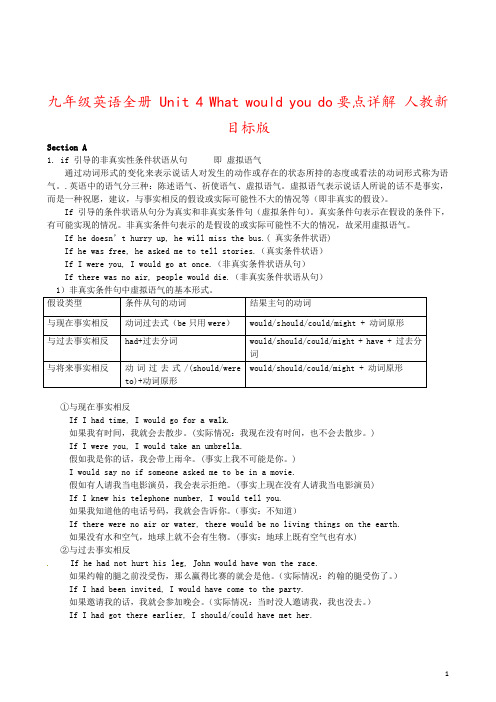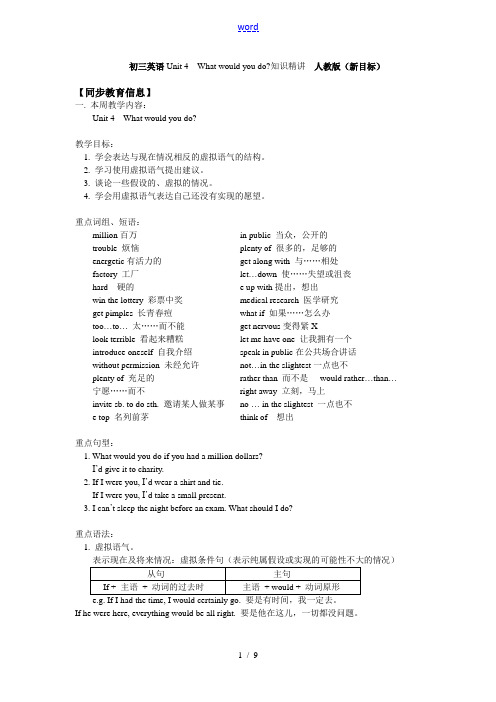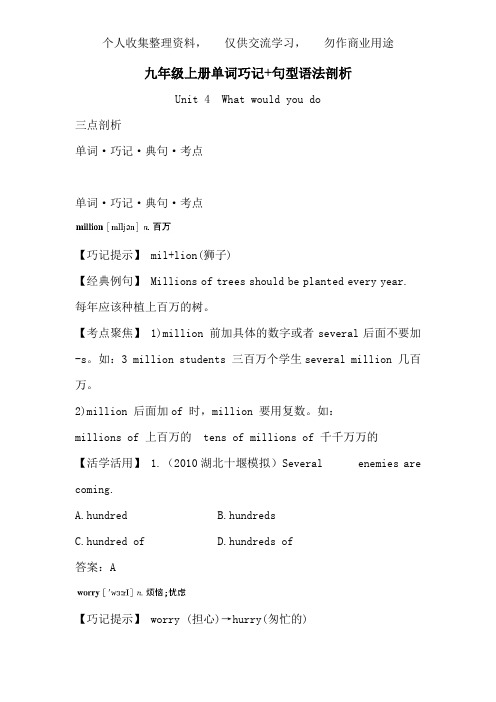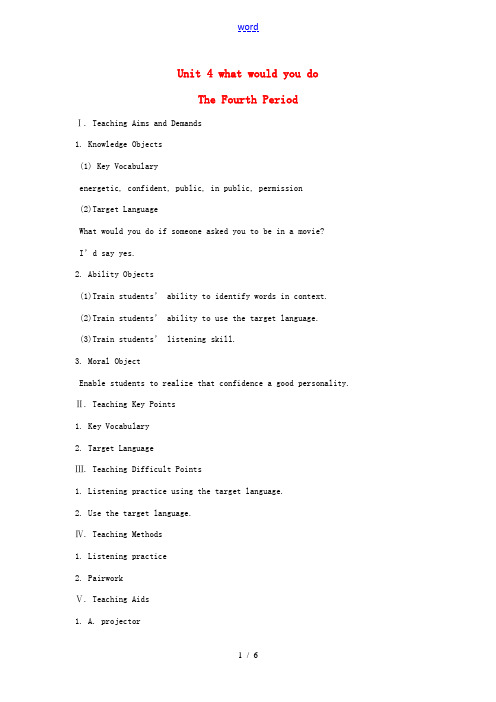九年级英语Unit 4 What would you do知识精讲
九年级英语全册 Unit 4 What would you do要点详解 人教新目标版

九年级英语全册 Unit 4 What would you do 要点详解 人教新目标版Section A1. if 引导的非真实性条件状语从句 即 虚拟语气通过动词形式的变化来表示说话人对发生的动作或存在的状态所持的态度或看法的动词形式称为语气。
.英语中的语气分三种:陈述语气、祈使语气、虚拟语气。
虚拟语气表示说话人所说的话不是事实,而是一种祝愿,建议,与事实相反的假设或实际可能性不大的情况等(即非真实的假设)。
If 引导的条件状语从句分为真实和非真实条件句(虚拟条件句)。
真实条件句表示在假设的条件下,有可能实现的情况。
非真实条件句表示的是假设的或实际可能性不大的情况,故采用虚拟语气。
If he doesn ’t hurry up, he will miss the bus.( 真实条件状语)If he was free, he asked me to tell stories.(真实条件状语)If I were you, I would go at once.(非真实条件状语从句)If there was no air, people would die.(非真实条件状语从句) 1)非真实条件句中虚拟语气的基本形式。
①与现在事实相反If I had time, I would go for a walk.如果我有时间,我就会去散步。
(实际情况:我现在没有时间,也不会去散步。
)If I were you, I would take an umbrella.假如我是你的话,我会带上雨伞。
(事实上我不可能是你。
)I would say no if someone asked me to be in a movie.假如有人请我当电影演员,我会表示拒绝。
(事实上现在没有人请我当电影演员)If I knew his telephone number, I would tell you.如果我知道他的电话号码,我就会告诉你。
初三英语Unit4 What would you do知识精讲 人教版(新目标)

初三英语Unit 4 What would you do?知识精讲人教版(新目标)【同步教育信息】一. 本周教学内容:Unit 4 What would you do?教学目标:1. 学会表达与现在情况相反的虚拟语气的结构。
2. 学习使用虚拟语气提出建议。
3. 谈论一些假设的、虚拟的情况。
4. 学会用虚拟语气表达自己还没有实现的愿望。
重点词组、短语:million百万in public 当众,公开的trouble 烦恼plenty of 很多的,足够的energetic有活力的get along with 与……相处factory 工厂let…down 使……失望或沮丧hard 硬的 e up with提出,想出win the lottery 彩票中奖medical research 医学研究get pimples 长青春痘what if 如果……怎么办too…to…太……而不能get nervous变得紧Xlook terrible 看起来糟糕let me have one 让我拥有一个introduce oneself 自我介绍speak in public在公共场合讲话without permission 未经允许not…in the slightest一点也不plenty of 充足的rather than 而不是would rather…than…宁愿……而不right away 立刻,马上invite sb. to do sth. 邀请某人做某事no … in the slightest 一点也不e top 名列前茅think of 想出重点句型:1. What would you do if you had a million dollars?I’d give it to charity.2. If I were you, I’d wear a shirt and tie.If I were you, I’d take a small present.3. I can’t sleep the night before an exam. What should I do?重点语法:1. 虚拟语气。
九年级上册单词巧记+句型语法剖析(Unit 4 What would you do)

九年级上册单词巧记+句型语法剖析Unit 4 What would you do三点剖析单词·巧记·典句·考点单词·巧记·典句·考点【巧记提示】 mil+lion(狮子)【经典例句】 Millions of trees should be planted every year.每年应该种植上百万的树。
【考点聚焦】 1)million 前加具体的数字或者several后面不要加-s。
如:3 million students 三百万个学生several million 几百万。
2)million 后面加of 时,million 要用复数。
如:millions of 上百万的tens of millions of 千千万万的【活学活用】 1.(2010湖北十堰模拟)Several enemies arecoming.A.hundredB.hundredsC.hundred ofD.hundreds of答案:A【巧记提示】 worry (担心)→hurry(匆忙的)【经典例句】 The worry showed on her face.她的脸上显出焦虑的神色。
【考点聚焦】固定搭配:1)worry about 意思是“担心、担忧”。
如:Don’t worry about me,I can look after myself.不要担心我,我能照顾我自己。
2)be worried about 意思是“担心”。
如:He is worried about his son all the time.他一直都担心他儿子。
【活学活用】 2.选择题At night,you can see stars in the sky.A.3 millions oflions oflion ofD.3 millions答案:B【经典例句】 It is annoying to miss a train.赶不上火车是烦人的事。
九年级英语:Unit 4 What would you do知识点复习(人教新目标版)

Unit 4 What would you do?一、教学内容:Unit 4 What would you do?二. 学习目标Functions:1. 谈论一些假设的、虚拟的情况2. 初步学习虚拟语气3. 使用虚拟句提出建议三、教学重点、难点:掌握与现在事实相反的虚拟条件句四、重点词和短语1. give it to charity 把它给慈善机构2. medical research 医学研究3. watch it grow 看着它上涨增值4. wear a shirt and tie 穿衬衣打领带5. what if 如果……将会怎么样6. get pimples 得了小脓疱7. speak in public 在公共场合说话8. give / make a speech 演讲9. in front of 在……前面in the front of 在……前部10. be in a movie 拍电影11. without permission 未经允许12. introduce sb. to sb. 把某人介绍给某人13. pretty/fairly confident 相当自信14. social situations 社会情况15. bother sb. 打扰某人16. not….in the slightest 根本不,一点也不not…at all 根本不,一点也不17. annoy sb. 使某人生气get/be annoyed at sb. 对某人生气18. plenty of 足够的,很多的19. get along with 与……相处20. be easy to get along with 容易交往/相处21. rather than 胜于A rather thanB A胜于Bwould rather do A than do B 宁愿做A也不愿做B22. English speech contest 英语演讲比赛23. represent the class 代表班级24. e top 名列前茅25. let sb. down 使某人失望26. e up with 针对问题提出想法27. the rest of 剩余的……28. first-aid book 急救书29. have a lot of experience doing sth. 做某事有很多经验30. do with=deal with 处理31. e out 出版,发表32. by accident 偶然地;意外地33. cover sth. with sth. 用某物盖住某物be covered with sth. 被……覆盖34. press sth. hard 用力挤压35. hurry to do sth. 快速做某事36. get the medical help 取得医护帮助37. the burned area 受伤的地方38. (cold) running water (冰)自来水39. offer sb. sth. 提供某人某物40. talk to sb. about sth. 与某人谈论某事41. be dangerous of/doing sth. 做某事危险42. internet friend 网友五、重点、难点、考点及疑点注释1. If I were you, I’d wear a shirt and tie. 如果我是你,我就穿衬衫打领带。
九年级英语Unit 4 what would you do语法知识点

Unit 4 what would you do?1.What would you do if you had a million dollars? 如果你有一百万美元你会做什么?本句是一个虚拟语气的句子,当if引导的条件状语从句所表达的内容不是事实或者不可能发生的情况,而仅仅是一种愿望、建议,或者是与事实相反的假设时,应用虚拟语气,其构成为:主句:主语+would/could/should/might+动词原形;从句:If+主语+动词过去式(当谓语是be动词时,任何人称都是用were)Eg: 如果我是一只小鸟,我会在天空中自由翱翔。
____________________________________ 如果他有足够的钱的话,他会买辆车。
__________________________________________ 注意:if引导真实条件状语从句时,即表示在假设的条件下,有可能实现的情况,遵循“主将(一般将来时)从现(一般现在时)”原则。
Eg:I'll go home if it doesn't rain tomorrow.如果明天不下雨,我将会回家。
(明天有可能会下雨)()1.—I don’t know if Tom_______these “stay-home children”tomorrow morning. --If I______he,I would come earlier.A.will come to take care of; ame to look after;wereC.will come to take care of;werees to come up with;am( )2.If I_______her, I would sing a song at the party.A.amB.wasC.areD.were( )3.I don’t know if he______here. If he_______tomorrow,I will tell you.A.will come;comeses;will comees;comesD.will come;will come( )4. What would you do if you _______ a million dollars .A. winB. will winC. wonD. wouldlion 名词,意为“百万”,当hundred,thousand,million和billion等词前有数词或相当于数词的词时,这些词不变复数,也不与of连用;如果其前没有数词,既要变复数,也要与of连用,意为“数以……计的”。
九年级英语全册 Unit 4 what would you do The 4th Period示范教

Unit 4 what would you doThe Fourth PeriodⅠ. Teaching Aims and Demands1. Knowledge Objects(1) Key Vocabularyenergetic, confident, public, in public, permission(2)Target LanguageWhat would you do if someone asked you to be in a movie?I’d say yes.2. Ability Objects(1)Train students’ ability to identify words in context.(2)Train students’ ability to use the target language.(3)Train students’ listening skill.3. Moral ObjectEnable students to realize that confidence a good personality. Ⅱ. Teaching Key Points1. Key Vocabulary2. Target LanguageⅢ. Teaching Difficult Points1. Listening practice using the target language.2. Use the target language.Ⅳ. Teaching Methods1. Listening practice2. PairworkⅤ. Teaching Aids1. A. projector2. A tape recorderⅥ. Teaching ProceduresStep Ⅰ Revision1. Check the homework exercises on pages 11~12 of the workbook.2. Say, If I had a day off today, whatwould I do.9 Encourage students togive advice using sentences beginning with if I were you,I’d...or you should….. See how many pieces of advice students are able to think of.Step Ⅱ1aThis activity reviews earlier vocabularyand introduces some new words. Introduce the key vocabulary words on page29 by showing them on the screen by aprojector.Say the words one by one and have students repeat several times.Write them on the blackboard.Read. the instructions to the class.Point to the five words above the box. Invite a student to read them to the class. Ask students to tell what each word means. For example, for the word out going, a student might say, outgoing means friendly.Focus attention on the five numbered sentences in the box. Point out the sample answer. Ask students to think about which word would work best in each blank.Get students to fill in the blanks on their own. Walk around the room offering help as needed.Ask different students to read their Sentences, filling the blanks. The rest of the class check their answers.Correct the answers.Answers1. Confident2. Outgoing3. Creative4. Shy5. EnergeticStep Ⅲ 1bThis activity provides oral practice using the target language.Read the instructions to the class.Call students’attention to the sample conversation. Invite a pair of students to read it to the class.S A :What are you like?s B :I think I’m creative and outgoing.Say, Practice in pairs. Say the sample conversation first. Then make conversations to tell each other what words in activity la describe you.Have students practice in pairs. As they work, walk around the classroom checking progress and offering language support as needed. Have a few pairs of students to share their conversations with the class.Step Ⅳ2aThis activity provides listening practice using the target language.Call students’attention to the chart. Tell them that this is a questionaire about how confident you are. Explain to students that a questionaire means a written list of questions to be answered by a number of people.Point to the list of questions underneath the headline "What would you do…" Ask different students to read them to the class. Correct any pronunciation and into- nation errors.Say ,You are to listen to a conversation between Cellia and Bill. Check the questions Cellia asks.Play the recording the first time. Students only listen.Play the recording a second time. This time students listen and check the answers Cellia asks.Check the answers.AnswersChecked questions:√the teacher asked you to give a speech in front of the whole school?√someone asked you to be in a movie?TapescriptGirl 1:I just did a personality survey in Teen Time Magazine. It tells you how confident you are.Boy 1:Oh? How did you do, Cellia?Girl 1:I don’t know yet. But it’s a really interesting test. You should try it, Bill.Boy 1:OK.Girl 1: How about question 17 What would you do if the teacher asked you to give a speech in front of the whole school?Boy 1: I’d say I had a cold and couldn’t speak. I would be afraid to make a speech in front of the whole school.Girl 1: How about this movie question? What would you do if someone asked you to be in a movie?Boy 1:Oh,I’d say no. I’d be too nervous. What’s the next question?Girl 1:Let’s see…Step Ⅴ 2bThis activity provides listening practice using the target language.Point to the list of answers underneath the headline "I would…" Ask different students to read them to the class.Say, You are to listen to the same conversation again. This time listen to both the questions and answers. Gircle the letter of the correct answers to each question. Play the recording again. Students listen and circle Bill’s responses.Check the answers,AnswersBoth answers should be b.Step Ⅵ2cThis activity provides oral practice using the target language. Point to the sample conversation in the box. Invite a pair of students to read it to the class.S A: What would you do if someone asked you to be in a movie?S B: I’d say yes.Write it on the blackboard.Point out the personality survey in Activity 2a. Say, Please work in pairs. Ask and answer the questions in the survey.Get students to work in pairs. As the pairs work together, move around the classroom offering language and pronunciation support as needed.Check the answers by asking different pairs to share their conversations with the class.Step Ⅶ SummaryPointing to the blackboard, say we’ve learned these vocabulary words and the target language.Step Ⅷ HomeworkGet students to make as many conversations as they can using the questions and answers in the personality survey in Activity 2a.Step Ⅸ Blackboard Design。
初三英语(unit3-unit4)知识点总结

初三英语(unit3-unit4)单元知识总结Topics:Teenagers should be allowed to choose their own clothes.What would you do?重点词汇精讲1.allow sb. to do sth. 允许某人做某事Mother allows me to watch TV every night.be allowed to do sth. 被允许做某事LiLy is allowed to go to Qinzhou.2.get their ears pierced 穿耳洞get sth. done = have sth. done让/使(别人)做某事I get my car made. = I have my car made. 我让别人修好我的车3.enough 足够形容词+beautiful enoughenoughenough+名词enough foodenough to do… 足够…去做…I have enough money to go to Beijing.She is old enough to go to school.4.sb. seem to do sth.看起来好像…He seems to feel very sad.It seems that +从句It seems that he feels very sad.5.be strict with sb. 对某人严厉Mother is strict with her son.6.keep sb./sth. +形容词 使某人/某物保持….We should keep our city clean.7.have an opportunity to do sth. 有机会做某事have a chance of doing sth. 有机会做某事I have an opportunity to go to Beijing.I have a chance of going to Beijing.8.have +时间段+off 放假,休息We will have 2 days off.9.get in the way of 碍事,妨碍Her social life got in the way of her studies.10.think about 与think of 的区别①当两者译为:认为、想起、记着时,两者可互用I often think about/ of that day.②think about 还有“考虑”之意,think of 想到、想出时两者不能互用At last, he thought of a good idea.We are thinking about going Qinzhou.11.对… 热衷,对…兴趣be serious about doing sth./sthShe is serious about playing computer games/games. 12.practice doing 练习做某事She often practice speaking English.13.care about sb. 关心某人Mother often care about her son.14.a few 与a little 的区别,few 与little 的区别⑴a few 一些修饰可数名词a little 一些修饰不可数名词两者表肯定意义He has a few friends. T here is a little sugar in the bottle.⑵few 少数的修饰可数名词little 少数的 修饰不可数名词两者表否定意义He has few friends. There is little sugar in the bottle. 15.what if +从句如果…怎么办,要是… 又怎么样What if she doesn’t come? 要是她不来怎么办?What if LiLei knows? 如果李雷知道了怎么办?16.add sth. to sth. 添加…到…I added some sugar to water.17.help sb. do sth./ to do sth./with sth.They help with this problem.They help you relax/ to relax.18.introduce sb. to sb. 把某人介绍给某人I introduced Lily to Anna.19.invite sb. to do 邀请某人做某事Lily invited me to go to her home for supper. 20.introduce sb. to sb. 把某人介绍给某人I introduced Lily to Anna.21.invite sb. to do 邀请某人做某事Lily invited me to go to her home for supper.22.let sb. down 让某人失望Don’t let your mother down.23.come up with sth. 提出想出He came up with a good idea.24.have experience doing 在做某事有经验I have experience teaching Chinese.25.come out 出版,出来The magazine comes out once a week.26.by accident 偶然地,无意之中Last week I cut my finger by accident.27.plenty of 修饰不可数名词,也可以修饰可数名词,许多They have plenty of food/ apples.课文难点解析1.I don’t think twelve-year-olds should be allowed to get their ears pierced.我认为不应该允许12岁的孩子穿耳孔.2.They talk instead of doing homework.他们聊天而不是做作业.3.Only then will I have a chance of achieving my dream.只有这样我才能实现我的梦想.4.They should be allowed to practice their hobbies as much as they want.应该允许他们对业余爱好想练多长时间就练多长时间.5.We have nothing against running.我们没有理由反对他跑步.6.He doesn’t know if he should bring a present.他不知道是否该带礼物。
英语:Unit 4 What would you do知识梳理(人教新目标九年级)

Unit 4 What would you do ?一、词组1. what if2. not …in the slightest3. offer to do sth.4. offer sb. sth.5. plenty of6. get along with7. let….down 8. come up with9. get out of 10. come out11. in public 12. ask sb. for advice13. refuse to do sth. 14. would rather….than….15 give it to charity16. put it in the bank 17. give a speech18. by accident 19. deal with二、句型1. What would you do if you had a million dollars ? I’d give it to charity. / I’d give it to medical research.2. I don’t know what to wear . If I were you , I’d wear a shirt and tie . What if everybody else is wearing jeans and T-shirts ? Oh, you shouldn’t worry about what other people are wearing . What if I don’t know anyone ? If you don’t know anyone , you can talk to Tom .3. What would you do if the teacher asked you to give a speech in front of the whole school ? What would you do if someone asked you to be in a movie ?4. I can’t sleep the night before I take a big exam . Then I’m too tired to do well. What should I do ? If I were you , I’d take a long walk before going to bed . That should help you relax .5. You like talking to one or two people rather than to a group . You would also rather stay at home and read a good book than go to a party .6. Martin Robinson is a famous doctor who has a lot of experience dealing with teenagers .三、语言点1. whole与all的区别whole与all的意思基本相同,都有“整个的,所有的,全部的”意思。
- 1、下载文档前请自行甄别文档内容的完整性,平台不提供额外的编辑、内容补充、找答案等附加服务。
- 2、"仅部分预览"的文档,不可在线预览部分如存在完整性等问题,可反馈申请退款(可完整预览的文档不适用该条件!)。
- 3、如文档侵犯您的权益,请联系客服反馈,我们会尽快为您处理(人工客服工作时间:9:00-18:30)。
初三英语Unit 4 What would you do?【本讲主要内容】Unit 4 What would you do?通过本课的学习,我们应该能做下面的事:1、学会如何面对现实及学生如何提出合理化建议。
2、提高学生听力与口语交际的能力。
3、学会虚拟语气的用法及should用于提建议。
【知识掌握】【知识点精析】词汇用法:1、too…to意思是“太……而不能……”,例如:I’m too tired to do well.我太累了没法做好这件事。
The boy is too young to go to school.这个男孩年龄太小了,不能上学。
2、confident是形容词,意思是“有信心的,有把握的”,常用搭配为:be confident of sth/ that…例如:He feels confident of his victory.他对胜利有信心。
She is confident of winning the race.= She is confident that she will win the race.她确信她赛跑会获胜。
3、be afraid to do/ be afraid of doing / be afraid that /be terrified of的意思是“害怕……”。
例如:I’m afraid to walk alone in the forest.我不敢一人在森林里走。
I’m afraid of flying in a plane.我害怕坐飞机。
He was afraid that he would lose face.他担心丢面子。
4、in front of意思是“在……的前面”,表示“有距离的前面”。
例如:There is a tree in front of the house.房子前面有一棵树。
in the front of意思是:“在……(范围内)的前面”,例如:The teacher often stands in the front of the classroom.老师经常站在教室的前面。
5、want sb to do意思是“希望某人做某事”,例如:Class, I want you to hand in your report by Friday.各位同学,报告要在星期五以前交来。
6、think of意思是“想出,想到,想起”,例如:I can’t think of his phone number.我想不起他的电话号码。
It makes me sad when I think of my little dog’s death.当我想起我的小狗的死就很伤心。
7、come up with意思是“想出,找出(答案、计划)”。
例如:You’ve come up with a good idea.你想出的主意好极了!8、by accident/ chance意思是“偶然,碰巧”。
例如:I met him by accident/chance in the street that day.那天,我碰巧在街上遇见了他。
She stepped on my foot by accident/chance.她无意中踩了我的脚。
9、辨析:find, find out, look for, discover(1)find指寻找的结果,即“找到”。
是非延续性动词。
例如:Where did you find it?你是在哪里找到它的?(2)find out指“发现,查明,了解”,表示经过观察、调查把某事、某物查出、搞清楚,多用于复杂而不易直接查出的情况。
例如:I’ll try to find out who did this?我要设法弄清楚这是谁干的。
(3)look for作“寻找”解时,指寻找的动作和过程,是延续性动词。
I’m looking for a place for you to stay.我正在给你找住的地方。
(4)discover多指通过实验、调查、勘探等“发现、找到”未被发掘或认识的事物。
例如:Columbus discovered America.哥伦布发现了美洲。
10、辨析:alone, lonelyalone表示“独自一人(或仅几个人)”,多作表语;作后置定语时,表示“只有,仅仅”的意思。
例如:The man lives alone. 那位老人自己一个人住。
lonely既可以作定语也可以作表语;作定语时意思是“孤独的,偏僻的,荒凉的”;作表语时表示“寂寞的,孤单的”。
例如:When his family moved, Mark was lonely until he made new friends.马克一家搬家后,在没有交上新朋友前他一直很寂寞。
11、Why don't you …?是用来提出邀请、建议或对某人不愿做某事时提出的反问。
它并不表示怀疑,而是有肯定的意义。
在口语中,常常省略主语和谓语,只有“Why not +动词原形?”。
例如:Why don't you go to Beijing with your parents?你为什么不和父母去北京呢?It's too not today. Why not have a swim in the river?今天天气太热了。
为什么不去河里游泳呢?12、permission是permit的名词形式,意思是“许可,允许”。
without permission意思是“在没经许可下”。
语法的重点难点:(一)if 的用法1、虚拟语气:句子假设的情况如果是完全不存在的(与现在或过去的事实相反),或者实现的可能性很小(与将来的事实可能相反),这种句子叫做虚拟条件句,它的谓语动词用虚拟语气。
(1)if 引导的是非真实的条件句,表示“非真实的事情及情况”,这种事情很可能不会发生,只是想象中的当前的情况,以及并未发生的事情。
表示说话人的愿望、假设、猜测或建议,而不表示客观存在的事实,即表示与事实相反的情况。
其结构是:在从句中用动词过去时,在主句中用条件式:would+动词原形(If+ subject+ V.(ed) …,subject+ would+do …)If I were you, I would do it at once.如果我是你的话,我会马上做这件事。
If we had longer holidays, we would be perfectly happy.如果我们的假期再长一些,我们会相当愉快。
(2)if从句和主句都可以放在句子的开头。
例如:If I had the time, I would watch TV for 10 hours a day.如果我有时间,我会一天看十个小时的电视。
If you could go there with us, Ann would be very happy.如果你能和我们一起去,安将会十分高兴。
(3)在if之后,常用were而不用was,尤其是在正式文体中和“If I were you,…”这个句子中。
例如:If I were you, I’d wear a shirt and tie.如果我是你的话,我将穿衬衣、打领带。
If I were Bill Gates, I would give millions of money to the charities.如果我是比尔盖茨的话,我会把上百万的钱捐献给慈善机构。
If I were the headmaster, I would allow students to wear their own clothes.如果我是校长的话,我会允许学生穿他们自己的衣服到学校。
2、引导真实的条件状语从句,其结构是:在从句中用动词现在时,在主句中用将来式:will+动词原形。
例如:If it doesn’t rain tomorrow, we’ll go for a picnic.如果明天不下雨,我们将去野餐。
If he gets home early this evening, he will cook for us.如果他今晚回来早,他将为我们做饭。
If I am free this weekend, I will play basketball with my friends.如果这个周末我有空,我将和朋友一起去打篮球。
3、If在下面句子里的意思是“是否”,引导宾语从句。
例如:He doesn’t know if he should bring a present.他不知道是否应该带礼物。
4、What if用来表示询问或提建议。
意思是“如果……怎么办?”例如:What if aliens should invade the earth?如果外星人侵略怎么办?What if everyone else brings a present?如果其他人都带礼物该怎么办?What if I don’t know anyone?如果我谁都不认识该怎么办?(二)would rather do… than 的用法(1)would rather do…than…=had rather do…than…是固定用法,意为“宁可……(也)不愿,与其……不如……”通常简写为’d rather do。
(2)在would rather…than…这个结构中,必须注意前项和后项的对称,即than所连的词必须与前面的词项在词性和结构上相一致。
例如:I’d rather have the red one than the green one.我宁愿买这个红色的,而不是那个绿色的。
He’d rather play than work.他宁愿玩耍而不愿学习。
You would also rather stay at home and read a book than go to a party.你也会宁愿呆在家里读书而不愿去参加聚会。
功能用语及拓展:本单元涉及的功能用语有:1、Talk about how to solve the problems in the daily life<1>语言环境:当谈论生活方面的困难和提建议时,使用这类功能用语。
<2>主要句型:Target language:What would you do if you had a million dollars?If I were you, I would give it to medical research.give it to charities, buy snacks, put it in the bank, buy a big house, travel around the world, etc.What if I don’t know anyone?<3>典型句型:What would you do if you had a million dollars?I’d give it to medical research.If I were you, I’d wear a shirt and tie.If I were you, I’d take a small present.典型的提建议的句型:1、Why don’t you do sth.?2、Why not do sth.?3、What about doing sth.?4、How about doing sth.?5、You should do sth.6、You could do sth.7、You had better do sth. 8、If I were you, I would …【考点突破】【考点指要】(一)If的使用:(1)if 引导的是非真实的条件句,表示“非真实的事情及情况”,这种事情很可能不会发生,只是想象中的当前的情况,以及并未发生的事情。
